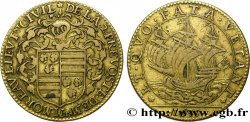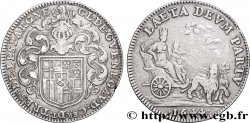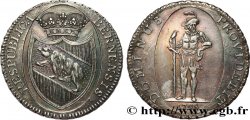fjt_014156 - PARIS - ILE DE FRANCE Jean-Charles-Pierre Lenoir et les illuminations de Paris 1774
Nicht verfügbar.
Artikel auf unserem Online-Shop verkauft (2010)
Preis : 380.00 €
Artikel auf unserem Online-Shop verkauft (2010)
Preis : 380.00 €
Type : Jean-Charles-Pierre Lenoir et les illuminations de Paris
Datum: 1774
Metall : Silber
Durchmesser : 32 mm
Stempelstellung : 12 h.
Rand lisse
Seltenheitsgrad : R2
N° im Nachschlagewerk :
Vorderseite
Titulatur der Vorderseite ILLUMN DE PARIS ETABLIE EN 1769 CONTINUEE PAR MR LENOIR ; À L'EXERGUE : 1774.
Beschreibung Vorderseite Armes de J. Lenoir, soutenues par deux lions.
Rückseite
Titulatur der Rückseite ILLO PROCURANTE NOX INSTAR DIEI.
Beschreibung Rückseite Minerve.
Übersetzung der Rückseite Par ses soins, la nuit équivaut au jour.
Kommentare
Ce jeton est frappé comme une médaille avec un listel très haut et un axe en médaille. Il n’est pas exclu qu’il ait cumulé les deux fonctions, celle de la célébration de l’évènement et celle de jeton personnel du Lieutenant de Police.
Très importante biographie sur le personnage à http://fr.wikipedia.org/wiki/Jean-Charles-Pierre_Lenoir
Jean-Charles-Pierre Lenoir - ou Le Noir - est né à Paris en 1732 et décédé à Paris en 1807. Issu d’une lignée de magistrats et de financiers, il est le fils de Jean Charles Joseph Lenoir (1687 – 1754), conseiller puis lieutenant civil au Châtelet de Paris.
Il initie sa carrière par des charges judiciaires. Il occupe ainsi celles de conseiller au Châtelet de Paris (1752), de lieutenant particulier (1754), puis de lieutenant criminel au Châtelet de Paris (1759), de maître des requêtes (1765), et enfin de président au Grand Conseil (1768). Il est à cette occasion rapporteur de la commission du procès de la Chalotais et on l'envoie rétablir le Parlement de Pau et apaiser les esprits de celui de Provence.
Il est nommé lieutenant général de police le 30 août 1774, en succession de Sartine dont il est l'ami. Il s'oppose alors à la politique de Turgot, considérant que la libéralisation des grains est nuisible au peuple de Paris. Lenoir, pour qui la question frumentaire devait être considérée sous l'angle de ce que l'historien Edward Palmer Thompson a qualifié « d'économie morale de la foule », s'attache à défendre les idées de “juste prix” et de responsabilité paternelle du roi envers ses sujets. Turgot, pour s'en débarrasser, lui propose alors la place de lieutenant civil qu'il refuse.
Quand les premiers troubles de la Guerre des Farines se manifestent le 3 mai, les journaux à la main et les gazettes lui reprochent sa mauvaise gestion des troubles populaires, pire, à l'instar de la Correspondance secrète de Mettra (9 mai 1775), d'avoir participer à un complot, à un "pacte de famine" selon l'expression du temps. Il lui est demandé de donner sa démission le 4 mai. Joseph Albert, intendant de commerce chargé du département général des subsistances, « économiste très outré », proche de Turgot, est nommé pour lui succéder.
La crise passée, après la démission de Malesherbes, de Turgot et d'Albert, Lenoir retrouve la lieutenance générale de police le 17 juin 1776. Un mémoire imprimé adressé à Marie-Thérèse d'Autriche - Détail de quelques établissements de la ville de Paris, demandé par sa majesté impériale, la reine de Hongrie [1780])- témoigne de son activité dans le domaine de l'approvisionnement et de ses efforts en matière de salubrité et d'utilité publique. Il s'attelle à la création d’une école de boulangerie et d'ateliers d'ouvriers, à la création de halles au grain et de marché, marqué qu'il est par l'épisode de 1775. On lui doit aussi des mesures contre les incendies, pour la prohibition du cuivre et du plomb dans le transport et le conditionnement des denrées, l'établissement des piliers dans les carrières sud de Paris ainsi que l'éclairage continu des rues principales de la capitale. Toutes ses mesures révèlent les grandes lignes d'un programme hygiéniste et modernisateur qu'il défend dans ses Mémoires..
This token is struck as a medal with a very high rim and a medal axis. It is not excluded that he combined the two functions, that of the celebration of the event and that of personal token of the Police Lieutenant.
Very important biography on the character at http://fr. Wikipedia. org/wiki/Jean-Charles-Pierre_Lenoir Jean-Charles-Pierre Lenoir - or Le Noir - was born in Paris in 1732 and died in Paris in 1807. Coming from a line of magistrates and financiers, he is the son of Jean Charles Joseph Lenoir (1687 – 1754), councilor then civil lieutenant at the Châtelet in Paris.
He began his career with legal charges. He thus held the positions of advisor at the Châtelet of Paris (1752), private lieutenant (1754), then criminal lieutenant at the Châtelet of Paris (1759), master of requests (1765), and finally president of the Grand Council (1768). On this occasion he was rapporteur of the commission for the Chalotais trial and was sent to re-establish the Parliament of Pau and calm the spirits of that of Provence..
He was appointed lieutenant general of police on August 30, 1774, in succession to Sartine, with whom he was a friend.. He then opposed Turgot's policy, considering that the liberalization of grain was harmful to the people of Paris.. Lenoir, for whom the grain question should be considered from the angle of what the historian Edward Palmer Thompson called \\\"the moral economy of the crowd\\\", strives to defend the ideas of \\\"just price\\\" and the paternal responsibility of the king towards his subjects.. Turgot, to get rid of him, then offered him the position of civil lieutenant, which he refused..
When the first troubles of the Flour War appeared on May 3, newspapers and gazettes criticized him for his poor management of the popular unrest, worse, like the Secret Correspondence of Mettra (May 9, 1775), for having participated in a plot, a \\\"famine pact\\\" according to the expression of the time.. He is asked to resign on May 4. Joseph Albert, trade intendant in charge of the general subsistence department, a \\\"very outrageous economist\\\" close to Turgot, was appointed to succeed him..
Once the crisis had passed, after the resignation of Malesherbes, Turgot and Albert, Lenoir returned to the lieutenant general of police on June 17, 1776.. A printed memorandum addressed to Maria Theresa of Austria - Details of some establishments in the city of Paris, requested by Her Imperial Majesty, the Queen of Hungary [1780] - bears witness to her activity in the field of supply and her efforts in matters of sanitation and public utility. He set about creating a bakery school and workshops for workers, creating grain markets and a market, marked as he was by the episode of 1775. He is also responsible for measures against fires, for the prohibition of copper and lead in the transport and packaging of foodstuffs, the establishment of pillars in the southern quarries of Paris as well as the continuous lighting of the main streets of the capital.. All his measures reveal the broad outlines of a hygienic and modernizing program that he defends in his Memoirs..
Très importante biographie sur le personnage à http://fr.wikipedia.org/wiki/Jean-Charles-Pierre_Lenoir
Jean-Charles-Pierre Lenoir - ou Le Noir - est né à Paris en 1732 et décédé à Paris en 1807. Issu d’une lignée de magistrats et de financiers, il est le fils de Jean Charles Joseph Lenoir (1687 – 1754), conseiller puis lieutenant civil au Châtelet de Paris.
Il initie sa carrière par des charges judiciaires. Il occupe ainsi celles de conseiller au Châtelet de Paris (1752), de lieutenant particulier (1754), puis de lieutenant criminel au Châtelet de Paris (1759), de maître des requêtes (1765), et enfin de président au Grand Conseil (1768). Il est à cette occasion rapporteur de la commission du procès de la Chalotais et on l'envoie rétablir le Parlement de Pau et apaiser les esprits de celui de Provence.
Il est nommé lieutenant général de police le 30 août 1774, en succession de Sartine dont il est l'ami. Il s'oppose alors à la politique de Turgot, considérant que la libéralisation des grains est nuisible au peuple de Paris. Lenoir, pour qui la question frumentaire devait être considérée sous l'angle de ce que l'historien Edward Palmer Thompson a qualifié « d'économie morale de la foule », s'attache à défendre les idées de “juste prix” et de responsabilité paternelle du roi envers ses sujets. Turgot, pour s'en débarrasser, lui propose alors la place de lieutenant civil qu'il refuse.
Quand les premiers troubles de la Guerre des Farines se manifestent le 3 mai, les journaux à la main et les gazettes lui reprochent sa mauvaise gestion des troubles populaires, pire, à l'instar de la Correspondance secrète de Mettra (9 mai 1775), d'avoir participer à un complot, à un "pacte de famine" selon l'expression du temps. Il lui est demandé de donner sa démission le 4 mai. Joseph Albert, intendant de commerce chargé du département général des subsistances, « économiste très outré », proche de Turgot, est nommé pour lui succéder.
La crise passée, après la démission de Malesherbes, de Turgot et d'Albert, Lenoir retrouve la lieutenance générale de police le 17 juin 1776. Un mémoire imprimé adressé à Marie-Thérèse d'Autriche - Détail de quelques établissements de la ville de Paris, demandé par sa majesté impériale, la reine de Hongrie [1780])- témoigne de son activité dans le domaine de l'approvisionnement et de ses efforts en matière de salubrité et d'utilité publique. Il s'attelle à la création d’une école de boulangerie et d'ateliers d'ouvriers, à la création de halles au grain et de marché, marqué qu'il est par l'épisode de 1775. On lui doit aussi des mesures contre les incendies, pour la prohibition du cuivre et du plomb dans le transport et le conditionnement des denrées, l'établissement des piliers dans les carrières sud de Paris ainsi que l'éclairage continu des rues principales de la capitale. Toutes ses mesures révèlent les grandes lignes d'un programme hygiéniste et modernisateur qu'il défend dans ses Mémoires..
This token is struck as a medal with a very high rim and a medal axis. It is not excluded that he combined the two functions, that of the celebration of the event and that of personal token of the Police Lieutenant.
Very important biography on the character at http://fr. Wikipedia. org/wiki/Jean-Charles-Pierre_Lenoir Jean-Charles-Pierre Lenoir - or Le Noir - was born in Paris in 1732 and died in Paris in 1807. Coming from a line of magistrates and financiers, he is the son of Jean Charles Joseph Lenoir (1687 – 1754), councilor then civil lieutenant at the Châtelet in Paris.
He began his career with legal charges. He thus held the positions of advisor at the Châtelet of Paris (1752), private lieutenant (1754), then criminal lieutenant at the Châtelet of Paris (1759), master of requests (1765), and finally president of the Grand Council (1768). On this occasion he was rapporteur of the commission for the Chalotais trial and was sent to re-establish the Parliament of Pau and calm the spirits of that of Provence..
He was appointed lieutenant general of police on August 30, 1774, in succession to Sartine, with whom he was a friend.. He then opposed Turgot's policy, considering that the liberalization of grain was harmful to the people of Paris.. Lenoir, for whom the grain question should be considered from the angle of what the historian Edward Palmer Thompson called \\\"the moral economy of the crowd\\\", strives to defend the ideas of \\\"just price\\\" and the paternal responsibility of the king towards his subjects.. Turgot, to get rid of him, then offered him the position of civil lieutenant, which he refused..
When the first troubles of the Flour War appeared on May 3, newspapers and gazettes criticized him for his poor management of the popular unrest, worse, like the Secret Correspondence of Mettra (May 9, 1775), for having participated in a plot, a \\\"famine pact\\\" according to the expression of the time.. He is asked to resign on May 4. Joseph Albert, trade intendant in charge of the general subsistence department, a \\\"very outrageous economist\\\" close to Turgot, was appointed to succeed him..
Once the crisis had passed, after the resignation of Malesherbes, Turgot and Albert, Lenoir returned to the lieutenant general of police on June 17, 1776.. A printed memorandum addressed to Maria Theresa of Austria - Details of some establishments in the city of Paris, requested by Her Imperial Majesty, the Queen of Hungary [1780] - bears witness to her activity in the field of supply and her efforts in matters of sanitation and public utility. He set about creating a bakery school and workshops for workers, creating grain markets and a market, marked as he was by the episode of 1775. He is also responsible for measures against fires, for the prohibition of copper and lead in the transport and packaging of foodstuffs, the establishment of pillars in the southern quarries of Paris as well as the continuous lighting of the main streets of the capital.. All his measures reveal the broad outlines of a hygienic and modernizing program that he defends in his Memoirs..








 Berichten über einen Fehler
Berichten über einen Fehler Die Seite drucken
Die Seite drucken Teilen meiner Auswahl
Teilen meiner Auswahl Stellen Sie eine Frage
Stellen Sie eine Frage Einlieferung/Verkauf
Einlieferung/Verkauf
 Details
Details















